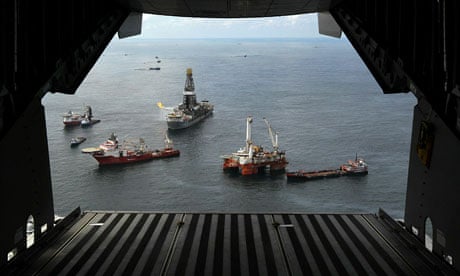A delicate "top kill" operation by BP appears to have halted the gush of oil and gas from its ruptured Macondo well in the Gulf of Mexico, although experts warned that the underwater leak was still far from being permanently fixed.
Engineers were due last night to begin a second round of pumping thick drilling mud at high speed into the ocean floor, which lies 5,000 feet (1,500 metres) under the surface of the sea about 50 miles off Louisiana.
Doug Suttles, BP's chief operating officer, insisted that the operation was going to plan, but admitted: "What we do know is that we have not yet stopped the flow."
He said BP engineers would soon use additional materials to try to plug the well, suggesting heavy mud deployed so far would not work on its own. "It's quite a roller coaster," he told a reporters' conference call, adding that the disaster had cost BP $850m so far.
The modest signs of progress came amid dismal news on the sheer extent of the environmental damage caused by the accident, which began when BP's Deepwater Horizon rig exploded on 20 April, killing 11 workers. New government estimates of a leak of 12,000 to 19,000 barrels of oil a day indicated that after 37 days, the slick could be twice as large as the fallout from the tanker Exxon Valdez, which hit a reef off Alaska in 1989.
"This will be felt for generations to come," said Regan Nelson, senior oceans advocate at the Natural Resources Defence Council in Washington. "It's an unprecedented disaster."
Environmental scientists who have toured the marshes off Louisiana by boat described a vast expanse of crude half an inch thick, with no visible sign of the BP or government clean-up efforts.
"We couldn't see into the water at all, one engine quit working," said Larry Schweiger of the National Wildlife Federation. "We are talking about really heavy oil spill out there, and no one is out there cleaning it. No one is out there measuring the scope of the oil mass."
Doug Inkley, a wildlife biologist with the National Wildlife Federation, described seeing dead jellyfish and sharks affected by the slick. "It's impossible to me to know how any living organism could survive in that," he said.
At least seven oil clean-up workers were taken to hospital yesterday after reporting nausea and headaches as a result of contact with chemical dispersants used to break up the slick.Administration officials said the cause of the illness was unclear.
Offshore, marine scientists from a University of South Florida research ship reported the discovery of a new underwater plume of oil extending 22 miles from the ruptured well towards Mobile Bay, Alabama, raising new fears about deep water toxicity.
After failing earlier in the month to halt the leak with a top hat-shaped dome, BP began pumping bargeloads of sludge into the well on Wednesday afternoon. Seven hours later, the company was able to drop the pressure at which it was pumping, a development considered positive by experts who said it meant the well contained a column of mud, rather than a plume of oil.
"That means they had enough pressure to displace the oil from the well into the rock formation," said David Summers, a professor of mining engineering at Missouri University of Science & Technology.
However, he said the job was not complete yet: "They haven't been able to totally balance the pressure. The column of mud in there should be stable enough to stand there by itself. But they're still having to apply a little bit of pressure to keep the column stable. That means they may not have got the mud all the way down the well yet."
There is still a risk that the pipe leading into the well could rupture. If the effort fails, BP has mooted trying a "junk shot" to block the leak by firing golf balls, tyres and other debris into the ocean floor.
Meanwhile, the company is drilling two "relief wells" to suck up oil in a controlled way, although these are unlikely to be ready until August.
Scientists warned there was potential for even greater damage, with a forecast of an unusually hazardous hurricane season. The national weather service in its yearly forecast for the hurricane season starting on 1 June predicted between eight to 14 hurricanes across the Atlantic. Of those, three to seven could be major hurricanes, category three storms or higher. Hurricane Katrina was a category three.
"If this outlook holds true, this season could be one of the more active on record," said Jane Lubchenco, the head of the National Oceanic and Atmospheric Administration, the government agency that oversees the forecast.
The pace of congressional investigations into the oil disaster also intensified with BP ordered to produce documents by June 3 into what was described as "questionable" decisions on well casing in the hours before the explosion. In a letter to BP, Henry Waxman, the head of the energy and commerce committee, said he was concerned by omissions in BP's 48-page briefing to Congress on the events leading up to the explosion. "This raises the possibility that BP's internal investigation is not examining the consequences of BP's own decisions and conduct," he said.Severe weather could accelerate the movement of the slick , which is threatening to stretch beyond Louisiana's coastline to the beaches of Florida and could spread as far as Cuba.








